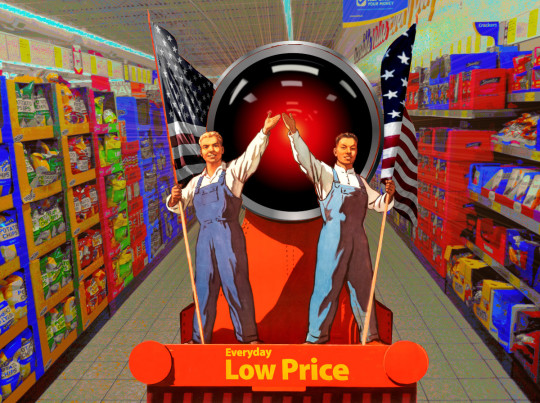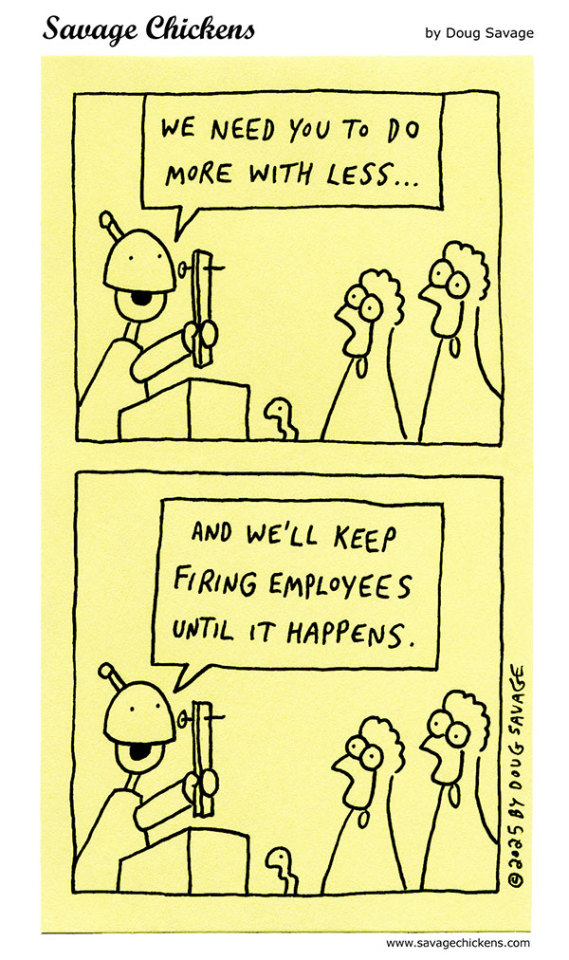#Efficiency
Explore tagged Tumblr posts
Text

"Markets are not perfect, but they are the most efficient and fair mechanism for resource allocation."
26K notes
·
View notes
Text
The cod-Marxism of personalized pricing

Picks and Shovels is a new, standalone technothriller starring Marty Hench, my two-fisted, hard-fighting, tech-scam-busting forensic accountant. You can pre-order it on my latest Kickstarter, which features a brilliant audiobook read by Wil Wheaton.

The social function of the economics profession is to explain, over and over again, that your boss is actually right and that you don't really want the things you want, and you're secretly happy to be abused by the system. If that wasn't true, why would your "choose" commercial surveillance, abusive workplaces and other depredations?
In other words, economics is the "look what you made me do" stick that capitalism uses to beat us with. We wouldn't spy on you, rip you off or steal your wages if you didn't choose to use the internet, shop with monopolists, or work for a shitty giant company. The technical name for this ideology is "public choice theory":
https://pluralistic.net/2022/06/05/regulatory-capture/
Of all the terrible things that economists say we all secretly love, one of the worst is "price discrimination." This is the idea that different customers get charged different amounts based on the merchant's estimation of their ability to pay. Economists insist that this is "efficient" and makes us all better off. After all, the marginal cost of filling the last empty seat on the plane is negligible, so why not sell that seat for peanuts to a flier who doesn't mind the uncertainty of knowing whether they'll get a seat at all? That way, the airline gets extra profits, and they split those profits with their customers by lowering prices for everyone. What's not to like?
Plenty, as it turns out. With only four giant airlines who've carved up the country so they rarely compete on most routes, why would an airline use their extra profits to lower prices, rather than, say, increasing their dividends and executive bonuses?
For decades, the airline industry was the standard-bearer for price discrimination. It was basically impossible to know how much a plane ticket would cost before booking it. But even so, airlines were stuck with comparatively crude heuristics to adjust their prices, like raising the price of a ticket that didn't include a Saturday stay, on the assumption that this was a business flyer whose employer was footing the bill:
https://pluralistic.net/2024/06/07/drip-drip-drip/#drip-off
With digitization and mass commercial surveillance, we've gone from pricing based on context (e.g. are you buying your ticket well in advance, or at the last minute?) to pricing based on spying. Digital back-ends allow vendors to ingest massive troves of commercial surveillance data from the unregulated data-broker industry to calculate how desperate you are, and how much money you have. Then, digital front-ends – like websites and apps – allow vendors to adjust prices in realtime based on that data, repricing goods for every buyer.
As digital front-ends move into the real world (say, with digital e-ink shelf-tags in grocery stores), vendors can use surveillance data to reprice goods for ever-larger groups of customers and types of merchandise. Grocers with e-ink shelf tags reprice their goods thousands of times, every day:
https://pluralistic.net/2024/03/26/glitchbread/#electronic-shelf-tags
Here's where an economist will tell you that actually, your boss is right. Many groceries are perishable, after all, and e-ink shelf tags allow grocers to reprice their goods every minute or two, so yesterday's lettuce can be discounted every fifteen minutes through the day. Some customers will happily accept a lettuce that's a little gross and liztruss if it means a discount. Those customers get a discount, the lettuce isn't thrown out at the end of the day, and everyone wins, right?
Well, sure, if. If the grocer isn't part of a heavily consolidated industry where competition is a distant memory and where grocers routinely collude to fix prices. If the grocer doesn't have to worry about competitors, why would they use e-ink tags to lower prices, rather than to gouge on prices when demand surges, or based on time of day (e.g. making frozen pizzas 10% more expensive from 6-8PM)?
And unfortunately, groceries are one of the most consolidated sectors in the modern world. What's more, grocers keep getting busted for colluding to fix prices and rip off shoppers:
https://www.cbc.ca/news/business/loblaw-bread-price-settlement-1.7274820
Surveillance pricing is especially pernicious when it comes to apps, which allow vendors to reprice goods based not just on commercially available data, but also on data collected by your pocket distraction rectangle, which you carry everywhere, do everything with, and make privy to all your secrets. Worse, since apps are a closed platform, app makers can invoke IP law to criminalize anyone who reverse-engineers them to figure out how they're ripping you off. Removing the encryption from an app is a potential felony punishable by a five-year prison sentence and a $500k fine (an app is just a web-page skinned in enough IP to make it a crime to install a privacy blocker on it):
https://pluralistic.net/2024/08/15/private-law/#thirty-percent-vig
Large vendors love to sell you shit via their apps. With an app, a merchant can undetectably change its prices every few seconds, based on its estimation of your desperation. Uber pioneered this when they tweaked the app to raise the price of a taxi journey for customers whose batteries were almost dead. Today, everyone's getting in on the act. McDonald's has invested in a company called Plexure that pitches merchants on the use case of raising the cost of your normal breakfast burrito by a dollar on the day you get paid:
https://pluralistic.net/2024/06/05/your-price-named/#privacy-first-again
Surveillance pricing isn't just a matter of ripping off customers, it's also a way to rip off workers. Gig work platforms use surveillance pricing to titrate their wage offers based on data they buy from data brokers and scoop up with their apps. Veena Dubal calls this "algorithmic wage discrimination":
https://pluralistic.net/2023/04/12/algorithmic-wage-discrimination/#fishers-of-men
Take nurses: increasingly, American hospitals are firing their waged nurses and replacing them with gig nurses who are booked in via an app. There's plenty of ways that these apps abuse nurses, but the most ghastly is in how they price nurses' wages. These apps buy nurses' financial data from data-brokers so they can offer lower wages to nurses with lots of credit card debt, on the grounds that crushing debt makes nurses desperate enough to accept a lower wage:
https://pluralistic.net/2024/12/18/loose-flapping-ends/#luigi-has-a-point
This week, the excellent Lately podcast has an episode on price discrimination, in which cohost Vass Bednar valiantly tries to give economists their due by presenting the strongest possible case for charging different prices to different customers:
https://www.theglobeandmail.com/podcasts/lately/article-the-end-of-the-fixed-price/
Bednar really tries, but – as she later agrees – this just isn't a very good argument. In fact, the only way charging different prices to different customers – or offering different wages to different workers – makes sense is if you're living in a socialist utopia.
After all, a core tenet of Marxism is "from each according to his ability, to each according to his needs." In a just society, people who need more get more, and people who have less, pay less:
https://en.wikipedia.org/wiki/From_each_according_to_his_ability,_to_each_according_to_his_needs
Price discrimination, then, is a Bizarro-world flavor of cod-Marxism. Rather than having a democratically accountable state that sets wages and prices based on need and ability, price discrimination gives this authority to large firms with pricing power, no regulatory constraints, and unlimited access to surveillance data. You couldn't ask for a neater example of the maxim that "What matters isn't what technology does. What matters is who it does it for; and who it does it to."
Neoclassical economists say that all of this can be taken care of by the self-correcting nature of markets. Just give consumers and workers "perfect information" about all the offers being made for their labor or their business, and things will sort themselves out. In the idealized models of perfectly spherical cows of uniform density moving about on a frictionless surface, this does work out very well:
https://pluralistic.net/2023/04/03/all-models-are-wrong/#some-are-useful
But while large companies can buy the most intimate information imaginable about your life and finances, IP law lets them capture the state and use it to shut down any attempts you make to discover how they operate. When an app called Para offered Doordash workers the ability to preview the total wage offered for a job before they accepted it, Doordash threatened them with eye-watering legal penalties, then threw dozens of full-time engineers at them, changing the app several times per day to shut out Para:
https://pluralistic.net/2021/08/07/hr-4193/#boss-app
And when an Austrian hacker called Mario Zechner built a tool to scrape online grocery store prices – discovering clear evidence of price-fixing conspiracies in the process – he was attacked by the grocery cartel for violating their "IP rights":
https://pluralistic.net/2023/09/17/how-to-think-about-scraping/
This is Wilhoit's Law in action:
Conservatism consists of exactly one proposition, to wit: There must be in-groups whom the law protects but does not bind, alongside out-groups whom the law binds but does not protect.
https://en.wikipedia.org/wiki/Francis_M._Wilhoit#Wilhoit's_law
Of course, there wouldn't be any surveillance pricing without surveillance. When it comes to consumer privacy, America is a no-man's land. The last time Congress passed a new consumer privacy law was in 1988, when they enacted the Video Privacy Protection Act, which bans video-store clerks from revealing which VHS cassettes you take home. Congress has not addressed a single consumer privacy threat since Die Hard was still playing in theaters.
Corporate bullies adore a regulatory vacuum. The sleazy data-broker industry that has festered and thrived in the absence of a modern federal consumer privacy law is absolutely shameless. For example, every time an app shows you an ad, your location is revealed to dozens of data-brokers who pretend to be bidding for the right to show you an ad. They store these location data-points and combine them with other data about you, which they sell to anyone with a credit card, including stalkers, corporate spies, foreign governments, and anyone hoping to reprice their offerings on the basis of your desperation:
https://www.404media.co/candy-crush-tinder-myfitnesspal-see-the-thousands-of-apps-hijacked-to-spy-on-your-location/
Under Biden, the outgoing FTC did incredible work to fill this gap, using its authority under Section 5 of the Federal Trade Commission Act (which outlaws "unfair and deceptive" practices) to plug some of the worst gaps in consumer privacy law:
https://pluralistic.net/2024/07/24/gouging-the-all-seeing-eye/#i-spy
And Biden's CFPB promulgated a rule that basically bans data brokers:
https://pluralistic.net/2024/06/10/getting-things-done/#deliverism
But now the burden of enforcing these rules falls to Trump's FTC, whose new chairman has vowed to end the former FTC's "war on business." What America desperately needs is a new privacy law, one that has a private right of action (so that individuals and activist groups can sue without waiting for a public enforcer to take up their causes) and no "pre-emption" (so that states can pass even stronger privacy laws):
https://www.eff.org/deeplinks/2022/07/federal-preemption-state-privacy-law-hurts-everyone
How will we get that law? Through a coalition. After all, surveillance pricing is just one of the many horrors that Americans have to put up with thanks to America's privacy law gap. The "privacy first" theory goes like this: if you're worried about social media's impact on teens, or women, or old people, you should start by demanding a privacy law. If you're worried about deepfake porn, you should start by demanding a privacy law. If you're worried about algorithmic discrimination in hiring, lending, or housing, you should start by demanding a privacy law. If you're worried about surveillance pricing, you should start by demanding a privacy law. Privacy law won't entirely solve all these problems, but none of them would be nearly as bad if Congress would just get off its ass and catch up with the privacy threats of the 21st century. What's more, the coalition of everyone who's worried about all the harms that arise from commercial surveillance is so large and powerful that we can get Congress to act:
https://pluralistic.net/2023/12/06/privacy-first/#but-not-just-privacy
Economists, meanwhile, will line up to say that this is all unnecessary. After all, you "sold" your privacy when you clicked "I agree" or walked under a sign warning you that facial recognition was in use in this store. The market has figured out what you value privacy at, and it turns out, that value is nothing. Any kind of privacy law is just a paternalistic incursion on your "freedom to contract" and decide to sell your personal information. It is "market distorting."
In other words, your boss is right.

Check out my Kickstarter to pre-order copies of my next novel, Picks and Shovels!

If you'd like an essay-formatted version of this post to read or share, here's a link to it on pluralistic.net, my surveillance-free, ad-free, tracker-free blog:
https://pluralistic.net/2025/01/11/socialism-for-the-wealthy/#rugged-individualism-for-the-poor

Image: Cryteria (modified) https://commons.wikimedia.org/wiki/File:HAL9000.svg
CC BY 3.0 https://creativecommons.org/licenses/by/3.0/deed.en
--
Ser Amantio di Nicolao (modified) https://commons.wikimedia.org/wiki/File:Safeway_supermarket_interior,_Fairfax_County,_Virginia.jpg
CC BY-SA 3.0 https://creativecommons.org/licenses/by-sa/3.0/deed.en
#pluralistic#personalized pricing#surveillance pricing#ad-tech#realtime bidding#rtb#404media#price discrimination#economics#neoclassical economics#efficiency#predatory pricing#surveillance#privacy#wage theft#algorithmic wage discrimination#veena dubal#privacy first
288 notes
·
View notes
Text

The Amazing AnswerBot.
125 notes
·
View notes
Text
starting and managing ur blog⋆.ೃ࿔*:・🍰

so you wanna start a blog? in this post i’ll break down effective ways to start, manage and maintain a blog (from my own experience of course) i hope u find this helpful ✨


TOPIC AND IDEA ;
to have a blog you need an idea or concept about what your blog will be about. make your blog about either something that you know a lot about/are proficient in.
or blog about something that u are learning about as a way to track ur progress and learn new information. you could blog about something that you love a lot etc etc.
AESTHETIC ;
what is your aesthetic? for me it’s hyper feminine and pink and just DIVINE. when u choose and stick to an aesthetic it’ll give ur blog kind of a signature which is important for the rest of this post.
when u have an aesthetic in mind for ur blog make sure that you have plenty of pins on pinterest that mesh nicely with ur aesthetic so u can find things like headers, dividers, photos and emojis that suit the aesthetic of ur blog.
RESOURCES ;
pinterest is my holy grail for resources. there u can find headers and photos to use in ur posts to give ur audience something visually pleasing to look at while they read ur post.
what ur gonna want to start off ur blog aesthetic and theme is ;
a header
a color scheme (for coloring/bolding words. and the colors for ur blog page in general)
an informative bio
a pfp
dividers
START OFF POST IDEAS ;
if u want to run a well organized blog there are a couple posts that i think are beneficial for u to make. in fact the most important post that i think any blog should have is a MASTERLIST.


master lists are great for a multitude of things. they help ur audience to navigate ur blog easier and see all that you have to offer in one convenient tap of their finger. plus when u make navigating ur blog easy, more people will experience ur content which will mean more interactions with ur post.
not only does it help the audience but it also helps u to know what u did and didn’t post, so that u can plan effectively for the future. it’s also a fun way to see how much u posted. i recommend making a new masterlist every year or when you can’t put any more links onto it 💀. if u want a reference for a good masterlist you can check out mine right here.
CONSISTENCY ;
consistency is key in anything and everything and blogging is no exception. i recommend not blogging in a competitive nature, rather i think in order to be consistent with something like a blog you should genuinely just do it for funsies/passion and as a way to have ur own authentic creative outlet.
i don’t have a set posting schedule bcuz i don’t want blogging to feel like a chore when in reality it’s just a hobby that happened to gain an audience because people enjoyed it. and because people enjoy what i write, it in return makes me happy and wanna write more.
SIGNATURE ;
i cannot stress this enough but when u have a platform whether it’s small or big individuality sets you apart! have something that sets u apart like personalized hash-tags, a way that u talk, etc etc.
personalize hash-tags with things like emojis. also, USE UR HASHTAGS because when someone looks up something like “self improvement” your post will be what they see if u add those hashtags.
furthermore if u personalize those hashtags it sets u apart and gives ur blog a kind of brand and individuality in a way. like a signature at the end of a post.
THINGS TO KEEP TRACK OF ;
what posts you’ve done/want to do
upcoming projects or ideas that u have
how your following/interactions are growing or shrinking
how much $ u get from tips
inbox questions or dms to answer
your plans and goals
your personalized hashtags
i hope this post was helpful to anyone who has been thinking about or wants to create their own blog, i encourage you to do so ✨
#honeytonedhottie⭐️#advice#becoming that girl#it girl#self care#self love#that girl#it girl energy#dream girl tips#dream girl#dream life#running a blog#girl blogging#girl blog#girl blogger#hyper femininity#ideas🌸#resources💬🎀#blog tips#creativity#self improvement#efficiency#blog management
470 notes
·
View notes
Text

Most airplanes are painted white to reflect sunlight, keeping the plane cooler and reducing the need for air conditioning, which helps save fuel.
73 notes
·
View notes
Text
"We should measure the prosperity of a nation not by the number of millionaires but by the absence of poverty, the prevalence of health, the efficiency of public schools, and the number of people who can and do read worthwhile books." W.E.B. Du Bois.
#quote of the day#quote of today#w. e. b. du bois#prosperity#wealth#nation#nation building#numbers#millionaires#health#healthcare#poverty#efficiency#schools#public schools#education#people#choices#decisions#possibilities#books#books and reading#books books books#agenda#politics#reading#what matters
316 notes
·
View notes
Text
Exploring the Smart Home Industry: Dreame's Innovative Solutions
The smart home industry is rapidly evolving, offering consumers innovative products that enhance convenience and comfort. One standout brand in this space is Dreame, known for its cutting-edge technology and user-friendly designs.
Dreame has introduced a range of smart appliances that integrate seamlessly into daily life, making home management easier than ever. Among their popular products, you might be curious about how much a Dreame hair dryer costs. This high-performance hair dryer not only dries hair quickly but also incorporates smart features that protect your hair from damage while ensuring a smooth finish.
Investing in smart home technology like Dreame's products can significantly improve your living experience. With their commitment to quality and innovation, Dreame is paving the way for a smarter, more efficient home.
124 notes
·
View notes
Text

“After all is said and done, more is said than done.” ― Aesop
64 notes
·
View notes
Text

182 notes
·
View notes
Text
Universal Remotes in the Smart Home Industry: SwitchBot Leads the Way!
If you're looking to simplify your life with smart home technology, look no further than SwitchBot! This innovative brand is revolutionizing the way we interact with our home devices, making it easier than ever to control everything from lights to appliances with just a click.
Universal remotes have become an essential tool in the smart home landscape, allowing users to manage multiple devices seamlessly. SwitchBot's universal remotes are designed with user-friendliness in mind, ensuring that everyone can enjoy the convenience of smart home technology without the hassle of multiple controllers.
By integrating various devices into one remote, SwitchBot empowers homeowners to create personalized experiences that enhance comfort and efficiency. Imagine dimming the lights, adjusting the thermostat, and starting your favorite music all from a single device!
With the rise of smart home technology, SwitchBot stands out as a leader, offering reliable and versatile solutions that fit perfectly into any home. Embrace the future of home automation and discover how universal remotes from SwitchBot can transform your living space today!
91 notes
·
View notes
Text
We put enormous emphasis on optimizing quantities. Our attention is shackled to screens where we make certain numbers go up and other numbers go down. We want to measure everything so that we can control and optimize it. The benefit of this is that we are able to fulfill our material needs more efficiently and with less effort.
But by doing so, we begin to think only about quantities. We create incentives to sacrifice quality in order to obtain better quantitative results. We become so focused on measuring and optimizing, on increasing efficiency and productivity, that we stop thinking about what is happening to us in our day-to-day lives.
It is perhaps not surprising that we then feel there is something missing — as though life is not going as well as it ought to be, even though all of the numbers are moving in the right direction.
Read more...
51 notes
·
View notes
Note

Huh, a border also have a link?
*click*
...
So that's how the phantom side of the clinic for the mentally ill looks like

Oh you found my secret button:D
322 notes
·
View notes
Text

The Plan for More.
And more productivity.
54 notes
·
View notes
Text
How are you guys making new content this fast? 😅 Don't you need processing time?
#i love this fandom#you're all so talented!#efficiency#byler#byler brainrot#byler endgame#byler canon#st5#stranger things 5#stranger things 5 theory#stranger things#mike wheeler#will byers
20 notes
·
View notes
